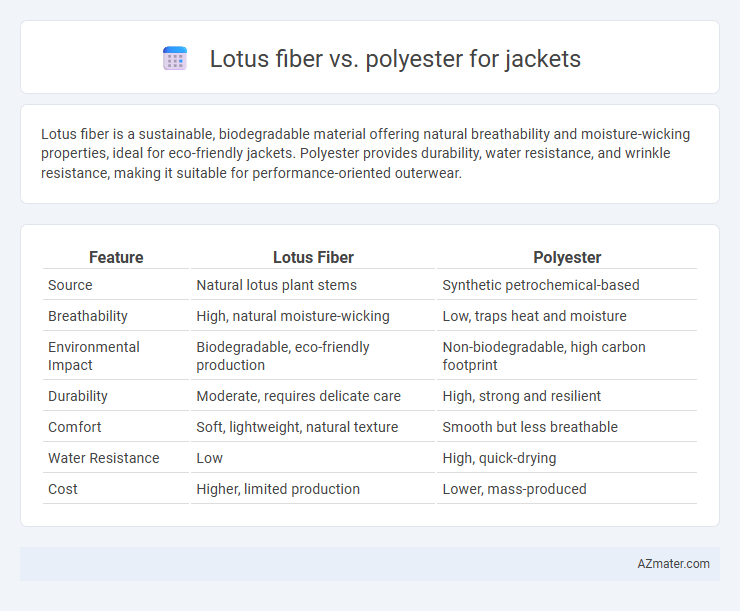Lotus fiber is a sustainable, biodegradable material offering natural breathability and moisture-wicking properties, ideal for eco-friendly jackets. Polyester provides durability, water resistance, and wrinkle resistance, making it suitable for performance-oriented outerwear.
Table of Comparison
| Feature | Lotus Fiber | Polyester |
|---|---|---|
| Source | Natural lotus plant stems | Synthetic petrochemical-based |
| Breathability | High, natural moisture-wicking | Low, traps heat and moisture |
| Environmental Impact | Biodegradable, eco-friendly production | Non-biodegradable, high carbon footprint |
| Durability | Moderate, requires delicate care | High, strong and resilient |
| Comfort | Soft, lightweight, natural texture | Smooth but less breathable |
| Water Resistance | Low | High, quick-drying |
| Cost | Higher, limited production | Lower, mass-produced |
Introduction to Lotus Fiber and Polyester
Lotus fiber, derived from the stem of lotus plants, is a sustainable and biodegradable natural textile known for its breathability and moisture-wicking properties, making it ideal for eco-friendly jacket production. Polyester, a synthetic polymer made from petroleum, offers durability, wrinkle resistance, and water repellency, widely used in jackets for its affordability and easy maintenance. Comparing lotus fiber and polyester highlights the contrast between eco-conscious natural fibers and high-performance synthetic materials in jacket manufacturing.
Origins and Production Processes
Lotus fiber is derived from the stems of the lotus plant, harvested primarily in regions like Myanmar and Thailand, where artisans manually extract and spin the fibers through a labor-intensive, eco-friendly process. Polyester, a synthetic material, originates from petrochemical sources, produced via industrial polymerization of purified terephthalic acid and monoethylene glycol, enabling mass production with consistent quality. The natural extraction of lotus fiber contrasts sharply with the chemical synthesis involved in polyester manufacturing, influencing sustainability and texture in jacket fabrics.
Environmental Impact Comparison
Lotus fiber is biodegradable and derived from renewable plant sources, significantly reducing environmental pollution compared to synthetic polyester, which relies on fossil fuels and contributes to microplastic pollution. The production of lotus fiber requires less water and energy, minimizing carbon emissions and preserving natural resources. Polyester jackets, while durable and easy to care for, generate persistent waste and have a larger ecological footprint throughout their lifecycle.
Breathability and Comfort
Lotus fiber jackets offer superior breathability due to their natural porous structure, which allows better air circulation and moisture wicking compared to polyester. The fiber's lightweight and soft texture enhances overall comfort, reducing skin irritation and overheating during wear. In contrast, polyester tends to trap heat and moisture, making it less effective for maintaining comfort in varying temperatures.
Durability and Longevity
Lotus fiber jackets offer natural durability and breathability, making them resistant to wear and tear while maintaining comfort over time. Polyester jackets are known for their high tensile strength and resistance to stretching, shrinking, and abrasion, contributing to excellent longevity even in harsh conditions. While polyester outperforms in water resistance and wrinkle retention, lotus fiber excels in biodegradability and maintaining structural integrity in natural environments.
Moisture-wicking and Water Resistance
Lotus fiber offers superior moisture-wicking properties due to its natural breathable structure, keeping the wearer dry and comfortable during intense activities. In contrast, polyester provides high water resistance with its synthetic, tightly woven fibers that repel water effectively but may retain moisture internally. Combining lotus fiber with a water-resistant finish can enhance both breathability and water repellency, outperforming standard polyester jackets in moisture management.
Weight and Packability
Lotus fiber jackets offer a lightweight and highly breathable alternative to polyester, making them ideal for warm weather and quick-drying needs. Polyester jackets tend to be bulkier and less compressible, which impacts packability compared to the natural, fine structure of lotus fiber that allows for easy folding and compact storage. Weight-wise, lotus fiber is notably lighter, enhancing overall comfort and convenience for outdoor activities where minimizing load is crucial.
Aesthetic and Texture Differences
Lotus fiber jackets exhibit a unique, natural luster with a subtle matte finish that enhances their organic aesthetic, contrasting sharply with the smooth, shiny appearance of polyester. The texture of lotus fiber is soft yet slightly coarse, providing a breathable and lightweight feel that adds to the garment's artisanal appeal, whereas polyester offers a more uniform, slick surface often associated with synthetic durability. These textural and visual differences make lotus fiber ideal for eco-conscious fashion seeking distinctiveness, while polyester suits those prioritizing uniformity and resilience.
Price and Market Availability
Lotus fiber jackets typically command a higher price due to their sustainable extraction process and limited production compared to widely available polyester options. Polyester jackets dominate the market with affordable pricing and mass production, making them more accessible for most consumers. The scarcity of lotus fiber and its artisanal crafting contribute to its premium market positioning and niche availability.
Best Uses: Which to Choose for Your Jacket?
Lotus fiber offers exceptional breathability and natural moisture-wicking properties, making it ideal for lightweight, eco-friendly jackets suited for warm climates or outdoor activities. Polyester excels in durability, water resistance, and insulation, perfect for versatile, weather-resistant jackets designed for colder or wet conditions. Choosing between lotus fiber and polyester depends on your preference for sustainability and comfort versus performance and weather protection in your outerwear.

Infographic: Lotus fiber vs Polyester for Jacket
 azmater.com
azmater.com